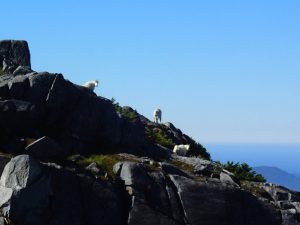For the past several years I’ve been laying the ground work for a new project to explore the coastal alpine regions of Laxyuup Gitxaała. This has involved small teams of keen students and avid back country campers joining me as we examine the various access points into Gitxaała’s alpine areas. These are rather special zones, unique and relatively rare – but also quite vast spaces. Unlike higher, interior alpine areas where environmental conditions keep trees away, the coastal alpine is a bit different. In most cases what has created the possibility of an alpine treeless zone is linked to past glacial action that scrubbed mountain tops bare. But this is getting ahead of ourselves as we start out on the next five years’ learning journey. Included below is the short summary of the reserach project.

Our Alpine Hosts.
Understanding and Indigenous Chain of Production
This project focuses upon First Nations’ contemporary chains of production that links homeland with diasporic communities through the production, distribution, and consumption of traditional goods (both food and materials). Our research will be based in Gitxaała Nation. To accomplish our research objectives we will walk alongside of food harvesters and materials gatherers as they pick, hunt, fish, grow, and collect the materials that they then transform into food and things. We will follow the path of these objects back home to Lach Klan (Gitxaała’s home village) where additional processing and then distribution takes place and consumption begins. Then we shall explore and examine the routes of distribution of these things as they make their way from the heart of Gitxaała territory out along social networks to community members living in far flung urban locales.
This collaborative, community-based project is designed to document and analyze the contemporary Gitxaała chain of production within an Indigenous intellectual frame. To achieve this we have set the following research objectives:
- Document and analyze processes of producing food and materials from coastal alpine areas of Gitxaała territory;
- Document and analyze processes of knowledge transmission and learning as multi-age community members demonstrate (and re-learn) Gitxaała processes of food and materials production, and;
- Document and analyze processes of food and materials distribution and consumption from the Gitxaała heartland outward.
In our research we prioritize a Gitxaała way of knowing. At the same time we acknowledge settler theorists from whom we borrow.
This research addresses a strongly expressed community request to research Gitxaała’s traditional chain of production as it works within the contemporary world and how it can be strengthened despite the majority of community members living outside of the home village. This is a concern that is shared in many aboriginal communities who, like Gitxaala, are rooted in ancient traditions while living in a shared contemporary world.
While based in Gitxaała project outcomes will have significance beyond the specific locale. Concerns related to linking diaspora with home community resonate across Indigenous communities. Identifying processes that enhance community engagement with home territories have relevance for all Indigenous communities and levels of government through the facilitation of relevant public policies and effective community programming.
